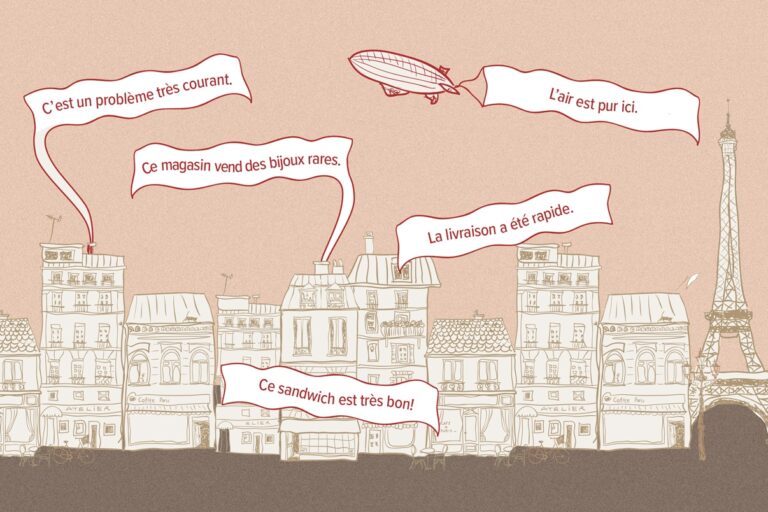How to Improve Your French Writing

Do you enjoy writing and learning French?
If so, why not do both? It’s one of the best ways to immerse yourself in the language.
In this post, we’ll look at how you can start with the basics and work up to practicing in a variety of different writing styles.
Download: This blog post is available as a convenient and portable PDF that you can take anywhere. Click here to get a copy. (Download)
Essentials for Writing in French
To be good at writing in French, there are a number of different skills that you’ll need to brush up on. Putting the following skills together will help your writing sound more fluent and improve your overall accuracy:
How to Write Well in French
Learn how narration works
Narrating in French involves a complicated weaving of different verb tenses. It’s critical to learn to use the right tense at the right time.
To set the scene, use the imparfait to describe things that are happening, or characteristics of participants, as the principal action is taking place.
Principal events in a timeline can be narrated in the passé composé or the passé simple. In some cases, this type of narration might even make use of the présent. Narration can be either in the present or in the past depending on the narrator’s point of view.
Let’s look at this sentence as an example:
Alors que le roi se promenait dans son jardin, un gland est tombé sur sa tête.
(As the king was walking in his garden, an acorn fell on his head.)
Notice how se promener is in the imparfait but tomber is in the passé composé. The king walking is “setting the scene,” and the acorn falling is the principal event in the narration. This is just one example of French narration.
Learn the passé simple
Instead of using the passé composé, we could use the passé simple when narrating principal events.
Our sentence thus becomes:
Alors que le roi se promenait dans son jardin, un gland tomba sur sa tête.
In written French, the passé simple can take the place of the passé composé (unless it’s a quote of someone speaking). It’s a much more economical way of narrating, although often not taught by French teachers.
Grow your vocabulary
Knowing your audience is just as important as good tense use. The way you write a text, specifically the vocabulary used, differs between, say, children’s stories, emails to your boss and text messages to your close friends.
Writing is a great way to learn vocabulary because you’re putting that vocabulary into use instead of just reading it.
Use online resources to get started
If you have story ideas but are unsure how to proceed, there are many online resources to help you.
Here are a few ways you can use them.
- Try collaborative French writing forums.
Certain forums, such as De Plume en Plume or Le Monde de L’Écriture, allow you to actually post short stories for review in exchange for reviewing other peoples’ work.
Commentary can include anything that helps you finish your story, be it grammar corrections, critiques or ideas of how to continue. These sites also propose written exercises such as collaborative writing or prompts like “Describe a garden in under 100 words.”
- Check out concours de nouvelles.
Many French libraries, universities and municipalities host writing contests called concours de nouvelles (literally “short story competition”) where certain people can submit a text. Some have entry conditions (e.g., participants must be under/over a certain age, live in a region, etc.), but others are open to anyone.
Usually, contests give you specific scenarios, such as writing a story based on a simple picture or completing an unfinished work.
Tips to Improve French Writing
There are a range of different ways you can improve your French writing skills. Here are some ideas to get you warmed up.
Track your progress with a journal
Language instructors often integrate a written journal into their curricula because it lets students see their improvement in real-time. The writing is personal, so you can experiment with more complicated structures, knowing you won’t be critiqued.
Try writing poetry
Poetry teaches you to not only write in French, but to become comfortable handling the language. This is your chance to break out of the groove of repetitive exercises and truly experiment. Try reading up on French poetry and then writing some of your own using rhyming, plays on words, etc.
Put new words to immediate use
You’re probably already reading French daily (or you should be!). Once you learn a new word, make sure you utilize it right away in your writing, otherwise it might slip away from your memory.
If you’re pressed for time, you can use language learning programs like Duolingo or Memrise to quickly pick up and learn French words.
Don’t use a dictionary too often
It’s okay if you can’t think of a synonym for every word. Just use the words you know. I try to “talk around” words I don’t know if I get stuck. After all, it’s what you do when speaking. Only if this is impossible should you use a dictionary.
Keep in mind that even if you know a word, you might not know its gender or spelling. Sometimes it’s possible to guess the spelling from pronunciation, and genders might be inferred from similar words, but often you’ll just have to memorize.
Write a little first, then check grammar
You don’t want to rely on dictionaries or grammar books to check every sentence, but at the same time you don’t want to wait until you’re completely done with a piece of writing to check it over. Usually I write roughly a paragraph, then check it before moving on. This lets me learn from my mistakes in real-time while not using learning resources as a crutch.
FluentU takes authentic videos—like music videos, movie trailers, news and inspiring talks—and turns them into personalized language learning lessons.
You can try FluentU for free for 2 weeks. Check out the website or download the iOS app or Android app.
P.S. Click here to take advantage of our current sale! (Expires at the end of this month.)
Why Are French Writing Skills Important?
It’s important to know that modern French society may test how well you write in many situations. Here are just a couple examples.
The phenomenon of graphologie
Even with computers, writing on paper remains very important in France. It’s so important, in fact, that many employers use it to learn more about their employees.
As part of a pseudo-scientific practice known as graphology, prospective employees submit handwritten letters that are analyzed by graphologists to determine psychological traits from their handwriting. The BBC provides a good explanation for the French enthusiasm for graphology.
The French take letters seriously!
It’s not a stretch to say that the French use written correspondence more than English speakers do. Up until recently, it was often considered more polite to submit handwritten letters of motivation than typed letters when applying for a job.
Unlike the relative creative liberty given in American business correspondence, French counterparts usually follow tried-and-true templates, such as the one seen here.
Notice the last line:
“Veuillez agréer, (Madame, Monsieur), l’expression de mes sincères salutations.” (Please accept, [Sir or Madam], the expression of my sincere greetings.)
This long-winded formality, called a formule de politesse, is one of the mainstays of formal communication in French—a long way from our simple “From” or “Sincerely”!
Now you have everything you need to start developing your French writing skills!
Although it might seem like a daunting task, with the above tips and plenty of practice, your writing should see an improvement in no time.
Download: This blog post is available as a convenient and portable PDF that you can take anywhere. Click here to get a copy. (Download)
And One More Thing...
If you like learning French at your own pace and from the comfort of your device, I have to tell you about FluentU.
FluentU makes it easier (and way more fun) to learn French by making real content like movies and series accessible to learners. You can check out FluentU's curated video library, or bring our learning tools directly to Netflix or YouTube with the FluentU Chrome extension.
One of the features I find most helpful is the interactive captions—you can tap on any word to see its meaning, an image, pronunciation, and other examples from different contexts. It’s a great way to pick up French vocab without having to pause and look things up separately.
FluentU also helps reinforce what you’ve learned with personalized quizzes. You can swipe through extra examples and complete engaging exercises that adapt to your progress. You'll get extra practice with the words you find more challenging and even be reminded you when it’s time to review!
You can use FluentU on your computer, tablet, or phone with our app for Apple or Android devices. Click here to take advantage of our current sale! (Expires at the end of this month.)











